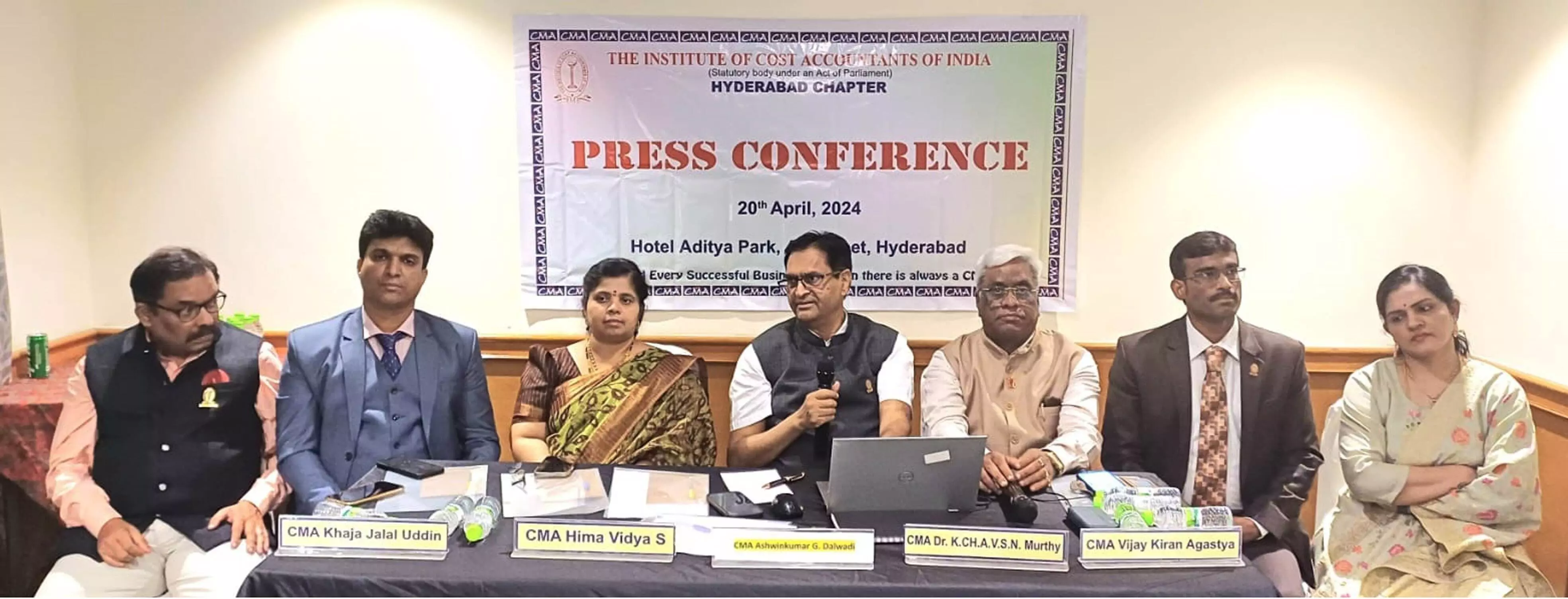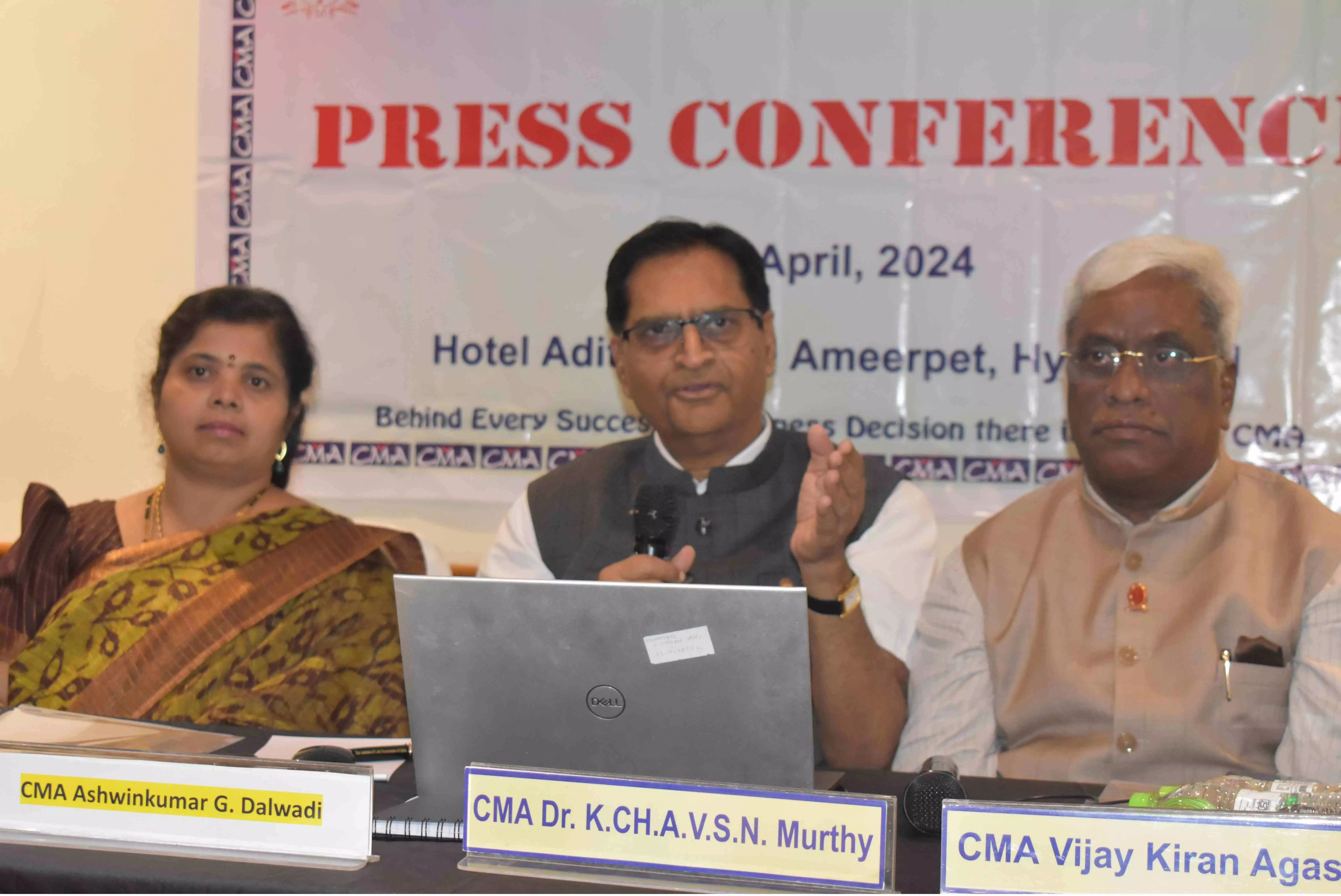CMAs leapfrogging from their traditional roles: ICMAI
Today, CMAs are serving the government, policy makers, industry, and the corporate world in building a strong and resilient economy. CMAs play a crucial and decisive role in business activities and operations, enabling management to make effective decisions and suggest corporate-favored policies and schemes.
image for illustrative purpose
Hyderabad: CMA Ashwinkumar G. Dalwadi, President, ICMAI; CMA Dr K.CH.A.V.S.N. Murthy, Central Council Member, ICMAI and CMA Hima Vidya Sanagavarapu, Chairperson, ICMAI, Hyderabad Chapter; addressed media about the initiatives of The Institute of Cost Accountants of India (ICMAI), in CMAs evolving as key functionaries in the era of disruption; at a Press Conference in Hyderabad.
CMA Ashwinkumar G. Dalwadi said, over the years, the role of Cost & Management Accountants (CMAs) has undergone a complete transformation. Today, CMAs are serving the government, policy makers, industry, and the corporate world in building a strong and resilient economy. CMAs play a crucial and decisive role in business activities and operations, enabling management to make effective decisions and suggest corporate-favored policies and schemes. CMAs assist organizations in accomplishing their objectives by evaluating and improving the adequacy and effectiveness of their operations, internal controls, governance processes, risk management, and control systems. This helps entities improve their performance, efficiency, productivity, profitability, and sustainability.
CMAs also assist the Government and various government authorities in advising on areas such as costing, pricing, and framing appropriate fiscal and tax policies and monitoring them. The importance of the profession of Cost and Management Accountancy in the economic development of the nation is underlined by the fact that the Central Government constituted the Indian Cost Accounts Service in 1978 at par with other Class-I services such as IAS, IFS, etc.
Further, under the Companies Act, the Government has introduced a provision for certain industries including service sector to maintain statutory Cost Accounting records and audit thereof.
With about 1,00,000 qualified CMAs and half-a-million students pursuing the CMA course, the Institute of Cost Accountants of India has grown to become the world’s largest professional body of cost & management accountants. ICMAI has been at the forefront of developing competent cost accounting professionals who play a key role in helping the business entities achieve cost competitiveness; improve performance, efficiency, productivity and profitability; ensure sustainability, and enhance effective utilization of resources deployed by them. The CMAs are also devising cost effective business models with life cycle cost advantages to sustain and perform consistently with economic, environmental, and social balance. Business entities are given professional view and expert inputs enabling the managements to take effective decisions to profess their ability to exist in a volatile, uncertain, complex, and ambiguous business environment.
ICMAI has been providing highly valuable support to the policy makers and Central Government Ministries & organizations in developing cost efficient strategies, systems & manuals. ICMAI has recently developed Activity Based Performance Costing System for Indian Railways that would assist the Indian Railways to correctly & timely measure and assess the performance of different activities or operations. The proposed Performance Costing System will also help Indian Railways to arrive at appropriate pricing or tariff decisions for passenger and freight services; to identify profitable, loss making and non-value-added activities; and to control and improve the business planning, budgeting, resource allocation, resource utilization, and investment decisions.
Today, CMAs are playing a key role in supporting the Government’s Atma Nirbhar Bharat initiative with the aim of helping India become cost-competitive, capture export markets, catalyze wider employment generation and GDP growth - all of which are necessary to achieve the Government’s goal of a $5 Trillion Economy.
Speaking about what future behold for the profession, CMA Ashwinkumar G. Dalwadi said, over time, there has been a positive paradigm shift in our profession, which has evolved and undergone major changes in all aspects, from curriculum to responsibility. CMAs have become partners in nation-building, with their role shifting from cost accountants in factories to management accountants in boardrooms. There have also been many milestones for our profession, with CMAs now working in fields such as taxation, corporate laws, arbitration, insolvency, valuation, social auditing, independent directorship, banking, and insurance.
Today, most of the businesses are facing major disruptions and VUCA (Volatility, Uncertainty, Complexity, and Ambiguity) challenges. In this disruptive scenario, Cost & Management Accounting has acquired a prime spot in ensuring survival, continuity, and sustainability. The application of Management Accounting can strategically improve an organization’s efficiency, productivity, and outcomes.
As CMAs act as a driving force in all economic activities, they hold top management positions such as Chairman, Managing Director, Director of Finance, Chief Finance Officer, Chief Executive Officer, General Manager, and Finance Manager in MNCs, private and public sectors, state and central governments.
The future holds great promise for the profession as it continues to evolve and adapt to the changing business landscape. CMAs will continue to play a crucial role in helping organizations navigate the challenges of the modern business environment and achieve their goals.
CMA Ashwinkumar G. Dalwadi, speaking about non-financial audits gaining momentum in India, said, In today’s competitive globalized world, sustainability and social responsibility are increasingly important factors in the viability and credibility of organizations. Improving performance and creating a positive image in the eyes of shareholders and stakeholders are becoming more relevant goals for organizations. This has led to a growing need for non-financial audits that consider the relationship of an organization with factors that may affect its reputation, such as the environment, health and safety standards, society, and governance within and outside the organization.
Social audit is an assessment of how well a company is achieving its goals or benchmarks for social responsibility. The main reason for the push for social audit is the significant disconnect between what people need, what the government thinks, and what is actually done. A social audit helps to narrow gaps between vision/goal and reality, between efficiency and effectiveness.
I believe that Cost and Management Accountants (CMAs) can add value to social audits. CMAs have the instinctive mindset and acumen, leveraged by competency built around theoretical knowledge and experience, to fulfill the requirements of social auditors. By professional training in auditing and being regulated by the Code of Conduct, CMAs qualify as the most preferred professional option to deliver social audits in India.
CMAs possess expertise in performance evaluation, cost-benefit analysis, variance analysis, management reporting, social audit, social cost-benefit analysis, and benchmarking. They have rich and varied experience in cost audits for several years, which involve analyzing the productivity of human, physical, and financial resources of an enterprise and ensuring that enterprise resources are channeled to deliver optimal, productive, and intended/desirable outcomes.
CMAs have also played a proactive role in monitoring and evaluating various social schemes launched and implemented by central and state governments. This expertise and experience make CMAs the most preferred professional option for conducting social audits.
About CMAs contribution in achieving VIKSIT BHARAT goals, CMA Ashwinkumar G. Dalwadi said, India has made remarkable strides in economic development over the years, emerging as one of the world's fastest-growing major economies. However, to sustain this growth, it should continue to focus on to achieve development goals.
Cost and management accountants play a multifaceted role in the development of a nation by contributing to efficient resource allocation, informed decision making, improved performance, regulatory compliance, cost control, risk management, and investment appraisal. Our expertise and insights are essential for fostering economic growth, promoting competitiveness, and ensuring financial stability in both the public and private sectors.
CMAs help in efficient allocation of resources by providing accurate costing information. This ensures that resources are utilized effectively, reducing wastage and improving productivity, which ultimately contributes to economic growth.
CMAs provide valuable financial insights and analysis to management, aiding in strategic decision making. By helping businesses make informed choices about investments, expansions, and resource allocation, we contribute to the overall development of industries and the economy.
CMAs develop performance measurement systems that evaluate the effectiveness of various departments, projects, and processes within organizations. By identifying areas for improvement and optimizing performance, we contribute to overall productivity gains in the economy.
CMAs access and manage financial risks faced by organizations, such as market risk, credit risk, and operational risk. By developing risk management strategies and implementing internal controls, we help safeguard the financial stability of businesses, which is essential for sustainable economic growth.
CMAs evaluate investment opportunities and assess their financial viability. By conducting cost-benefit analysis and assessing the long-term impact of investments, we help attract both domestic and foreign investment, which is crucial for infrastructure development and economic progress.
It's important to note that achieving these development goals requires concerted efforts from the government, private sector, civil society and professionals like CMAs as essential contributors to a nation's development by ensuring efficient resource management, promoting financial stability, and supporting strategic decision-making within organizations. The expertise of CMAs helps create a conducive environment for sustainable economic growth.
On his advice to youngsters wanting to be part of the profession, CMA Ashwinkumar G. Dalwadi; said, the CMA course is one of the most attractive professional qualifications in our country, as it enriches students with a high degree of employable skills and guarantees lifelong employability, statutorily recognized by the Parliament. CMAs are in great demand in the government sector, private sector, banking & finance sector, developmental agencies, education, training & research, as well as in the service and public utility sector. They hold apex positions due to their specialized knowledge and training.
We are witnessing an unprecedented acceleration of the evolution of the business environment, along with the rapid introduction of new technologies. This has resulted in continuous pressure on Professional Accountancy Organizations to adapt constantly and take these new constraints into account. It has become necessary to evolve the curriculum by introducing new goals, tools, and courses. The Institute has successfully launched a bouquet of online world-class employability and techno-skill training facilities in the form of ‘SAP Certification’, ‘Microsoft Certification’, ‘Cambridge University Certification’, and ‘E-filing’ for its students. We have also made 15 months of practical training mandatory and introduced Business Data Analytics, Business Communication, Entrepreneurship & Start-ups, and Risk Management in Banking & Insurance.
Furthermore, the Institute has crafted the CMA Syllabus 2022 in light of provisions of the National Education Policy 2020 of India that are considered relevant and appropriate in the best interest of students and other stakeholders. The predominant objective is to nurture today’s students into tomorrow’s globally oriented and socially responsible CMA professionals. Under the current dynamic environment, the Institute has already begun the process of Syllabi revision which is likely to be introduced from January 2026.
Today, industry is looking for CMA professionals who not only possess a certificate but also have a dedication to further improve themselves to meet future challenges. The skill set of professional accountants needs to quickly adapt to technological developments and enhance their data analytics and strategic management skills. Apart from learning digital skills, CMAs must further sharpen their technical skills, business skills, people skills, and leadership skills.



